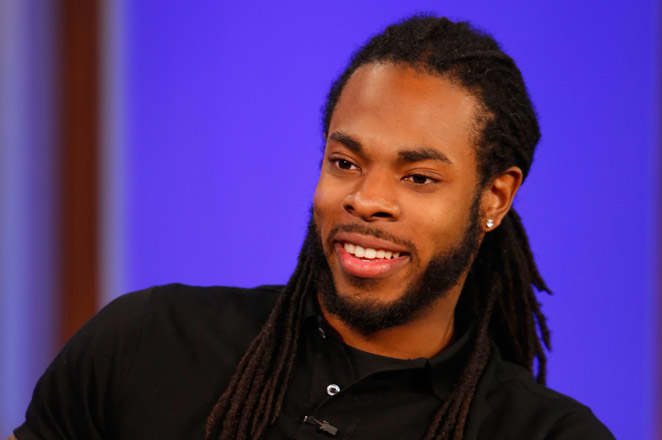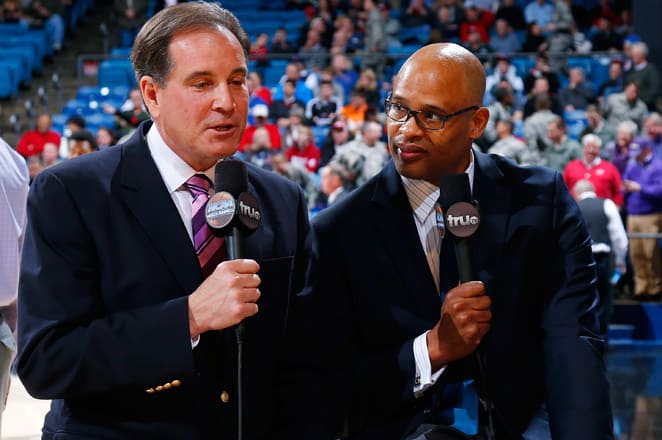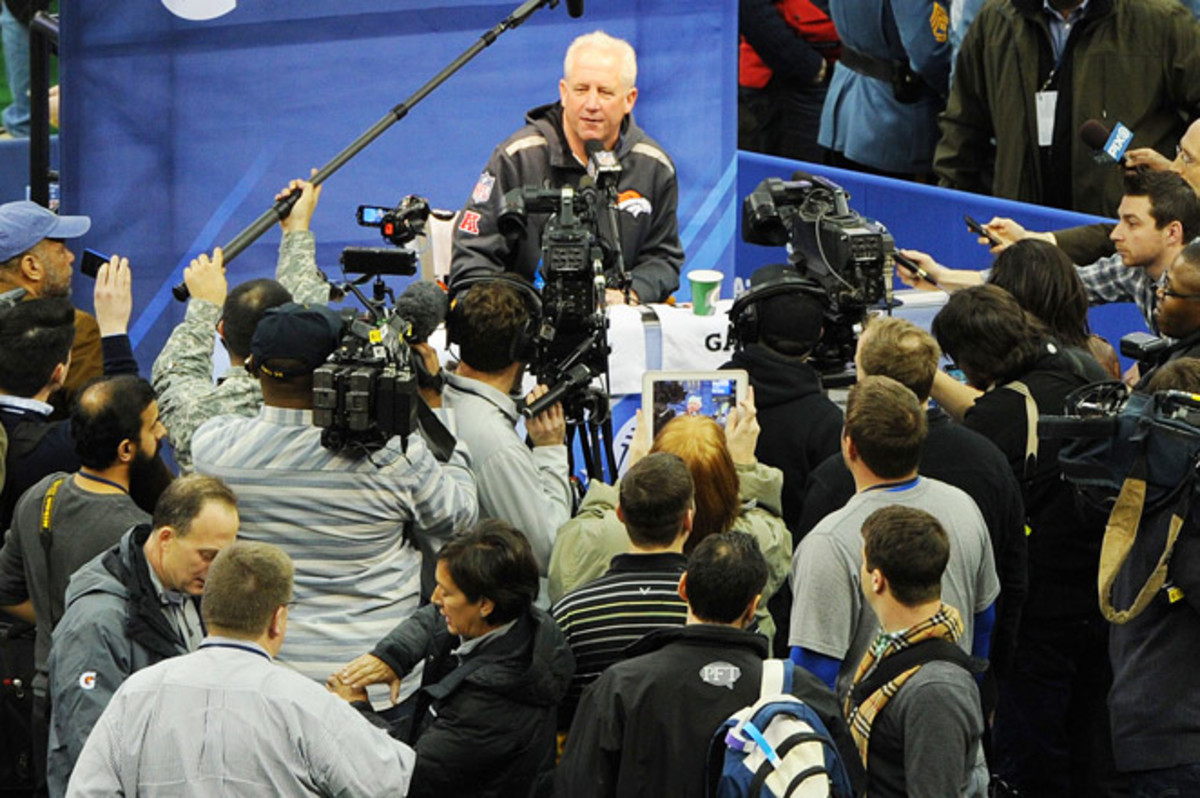Race, the N-word, discrimination: Panel on role of race in sports media

The sports media industry is still primarily made up of white males. Our race and sports media panel discusses the challenges of the industry, and how it can progress.
Maddie Meyer/Getty Images
Last November, I paneled a group of a six highly accomplished and respected female sports journalists for an SI.com email roundtable on the issues they deal with daily as women in the sports media. After publication of that story, a number of well-known sports journalists of color reached out suggesting I should do something similar on the issues sports media members of color deal with on a daily basis. That suggestion prompted the formation of the similarly well-accomplished and respected group below.
The panel:
•Cari Champion, host of ESPN2's First Take.
•Jemele Hill, co-host of ESPN2's Numbers Never Lie.
•Gregory Lee Jr., Executive Sports Editor, Florida Sun-Sentinel, Past NABJ President.
•Tim Kawakami, San Jose Mercury News sports columnist.
•Angel Rodriguez, sports editor, Cincinnati Enquirer.
•Darren Sands, sports business reporter and multimedia journalist, BlackEnterprise.com.
The panel was asked a series of email questions with no requirements. They were free to pass on any questions. For those of you on Twitter, the panelists are recommended and you can follow them by clicking on their names above. This is long, but I think worth your time if you want insight into today's sports media. Part I runs today. Part II of the panel's answers will run in next week's Monday Media Circus column.
QUESTIONS
SI.com: Most of you are on social media. How often do you get tweets/Facebook comments related to your race and what impact do they have?
Champion: More often than I'd like to admit. Working on a national show, five days a week gives me an amazing platform but also a significant amount of social media access. Someone created an account on Twitter to send me some very racist/sexist messages. My immediate response was to block whomever but they persisted. And while everyone says 'Don't read it' and 'Ignore it,' I'm here to say it doesn't always work. No matter how hard you try, a few messages will catch you. When I first began work at First Take it really bothered me because the words were very hateful, words that no one would dare say to your face. But unfortunately and fortunately, I've become immune. We live in a social media world where I now expect it. (Anyone with a public platform can more than likely relate.) There have been a few instances where ESPN security had to respond. To that end I'm more selective about who or whom I interact with and engage on social media.
Hill: Every day, I'm told to either go back to the kitchen or back to Africa. In fact, I checked my Twitter mentions 10 minutes after writing this, and a tweeter called me a monkey. It's unacceptable, but I came to the conclusion a long time ago that this was part of the job. I hate that I compartmentalize it that way because I'm giving a pass to those who verbally abuse people on social media. I can't afford to be impacted by it because if I am, then I can't do my job. I'd cry myself to sleep every night if I let what some idiots say on social media change how I did my job or what I thought of myself.
Kawakami: Sadly, because I respect that the Raiders fan base is so balanced demographically, I'd say that 20-to-25 percent of the angry Tweets and emails I get from Raiders fans have racial overtones or flat-out racist filth directed at me. My stance is that I think they're trying to intimidate me into saying only what they want. Racists are used to trying to intimidate people, and I don't get intimidated -- especially not by racists. Many wise people have told me that they don't like that I spend so much time on Twitter firing back at those who fire at me. I get that. But the racist element is the main reason I do. If I'm annoying, it's occasionally because I want to let the racists know that they can't stop me from being annoying. Otherwise, I don't see much of it. Always going to get some, but that's life as a columnist.
Lee: On the occasion that people resort to challenging my views as it relates to race, I will not attempt to engage them because 1.) you will not win on social media; 2.) you won't be able to provide proper context in social media and 3.) we never had a conversation in person that justifies those on Twitter to make judgments about me.
Rodriguez: I haven't gotten much of that on social media, thankfully. In my previous job as the home page manager for the Arizona Republic's website I used to get a lot of pretty crazy stuff on my voicemail. This was when the immigration debate was at its peak in Arizona and emotions were pretty high on both sides. My job was to decide what stories made it to the front page of the website. A local talk radio show host (and former U.S. Congressman) got on the radio and said that the reason the website wasn't more anti-immigrant was because I was hiding the real news. He gave out my phone number and told his listeners to call me and complain. The messages were pretty colorful. One caller said I should go back to Mazatlan. I'm not even from Mazatlan! (And who wouldn't want to go to Mazatlan?!) I got several others saying that I was biased because I was 'one those people with a 'ez' last name'. Several Hispanic reporters at the paper got a lot of abuse around that time, probably still do. We would share our craziest messages and see whose was worse.
Sands: People are allowed to act anonymously on the Internet with (save for a few notable occasions) little accountability for the things they tweet, comment and send. In this sense, the Web is really the wild West. It's unfortunate and can hurt sometimes, but it's why people shouldn't react and, in some cases, should not take themselves so seriously. I defer to the other panelists on this, especially Cari and Jemele, because they must deal with it every day.
SI.com: How much racism exists today in the sports media?
Champion: I can't say how much racism exists in it, but there are certain inequalities that are hard to ignore. For instance, second chances are rare for minorities and women on a national stage. There seems to be very little room for error. If you make a mistake on-air or if your personal life becomes public in a bad way, that person may find themselves with an early exit. But there are exceptions to the rule -- I am one of them. I lost my job in Atlanta at a local station. The process was not fair but I fought the process and was able to get my job back. However, I thought my identity would be tied to that incident and if that was the case, my opportunities would be few and far. But I was given another chance which eventually led to ESPN.
Hill: Better off than it used to be, but not nearly as progressive as we sometimes like to think it is. Even with the rise of new media, which I believe has opened the door for non-traditional sports media reporters, sports media remains white-male run and white-male focused.
Lee: The landscape remains institutionalized. During my 20 years in the newspaper business, the path to landing a job is about who you know. Sports editors tend to hire people they are comfortable around, people who could have a beer with them. It still happens. How else would you explain that 90 percent of the sports sections are made up of white males? There are only four African American sports editors at large newspapers today. One day, while in the offices of the Boston Globe, I had a conversation about potential candidates with my boss Joe Sullivan. I rattled off names of people I thought would be good for our NBA opening. My boss did not really know the people I named, so I invited him to attend the National Association of Black Journalists Convention in Las Vegas in 2007 so he could meet people that otherwise he would not have had on his radar for openings. There he made many connections with people not only in the job fair; Joe went to sports-related workshops, receptions and parties to get to know the talented journalists that were in attendance. The Globe would eventually hire great people such as Marc Spears and Gary Washburn, and Joe has been to a few more NABJ Conventions to check out talent pool and connect with the membership.
The problem in the industry is we don't have enough voices in the newsroom to shed light on the disparities there. There are not many people of color or women in editing positions who can influence decision-making. Joe and I were a great team because he knew I had access to a number of talented journalists of color due to my participation in NABJ and the Sports Journalism Institute, a program that helps minorities and women achieve careers in the industry. During my time at the Globe we brought in a number of talented people such as Jerome Solomon, Baxter Holmes, Julian Benbow and then Monique Walker (now Jones). But the key thing is editors should take personal responsibility in developing their own talent database and not rely on the company's recruiter. As an editor, I am expected to know who are the talented sports journalists around the nation, regardless of color. I should not have editors continuing to call me to locate talented minority journalists. I am happy to be a resource and headhunter for my fellow editors, but it's time for all of them to create their own pool of talent. If we do that, then our numbers will grow. An example of a double standard in sports media is that African American sports reporters are told the path to getting a column is to start from the bottom on the high school beat, work your way to a college beat and then cover a professional beat. A few years ago, a major newspaper gave a column to a white male who never had a major beat before. This person skipped over the entire process that African Americans were told they had to take. Let me tell you, that pissed off some of my friends in the business. Let's be clear, there was no animosity towards the new columnist. The frustrations rests with the consistent double standards that still exist.
Kawakami: I'm sure it's out there, because racism is always out there, just like every good and terrible thing about our society is always out there in whatever field any of us choose. So I don't want to be naive. But just from my very limited view in the Bay Area looking outwards, and if it's just talking about the sports media, I think the widening and shallowing out of this business has largely reduced the motivation of racists to act like racists. (That's me being cynical and optimistic at the same time, I think.) If the paper or magazine or TV network is losing readers/viewers -- if the entire industry is in jeopardy -- then the powerful people have to hire whoever the hell they think can keep them afloat, whether he or she is black, white, yellow or glowing neon. It's the desperation out there and (again cynical/optimistic) that drives the operating principle: Hire the people who can do the job, whoever they are, not just your buddies or people who look like you or people who kiss your rear end.
Rodriguez: When you look at the Pew numbers of minority representation in sports and in the news business in general, you realize pretty quickly that we aren't doing a good job of representing our communities. The lack of minority representation at upper levels of management is disheartening. When the top editors at any news organization do not have diverse voices you get a very one-sided conversation and the stories that come out of those story planning meetings tend to not accurately reflect the community.
Sands: The most pervasive form of racism that exists in the sports media is an offshoot of the cultural racism existent in professional sports. The ability to look down upon the cultures of hip hop and urban culture is connected to race. If there's a young basketball player with tattoos, that player experiences prejudice based on their look. It's hard to ignore the lack of nuance out there in terms of analysis and commentary. That's why media organizations would do well to hire, retain and cultivate talent who understand/live the culture of professional athletes. Not doing this is inherently racist, because it basically suggests the culture doesn't matter enough, is inferior or doesn't line up with the editorial decisions made on a daily basis.
Sands: Let's say we polled 100 young black athletes who admitted to using the n-word. I'm willing to bet the overwhelming majority do not A) say the word in professional settings (I do not consider the field of play such a setting), and B) would readily acknowledge that we all carry some responsibility for what it means for our society that the word is commonly used by babies, white people, by young people in Nairobi and Lagos and Freetown. Also: Count me in the number that believes we waste too much intellectual capital on the topic. Imagine if we spent the sum of our collective angst about 'nigga' on how to eradicate poverty. Not as sexy, though, is it?

An increased number of people of color in sports media management positions could help shape conversations around race, such as the one about Richard Sherman that escalated this postseason.
Randy Holmes/Getty Images
Sands: To be always bold, considerate and an independent thinker.

CBS moved Clark Kellogg off the No. 1 college basketball team, where he was the analyst alongside Jim Nantz since 2008, for a studio role.
Joe Robbins/Getty Images /SI
5g. Condolences to the family of Lonnie White, an Los Angeles Times sports writer for two decades and former USC footbal player.
5h. WCJBTV 20, an ABC affiliate in Gainesville, Fla., produced one of the most spectacular highlight reels ever. Just trust us:






